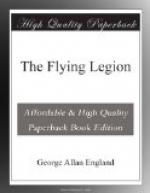As for the major, he dropped to his knees, threw down his weapons and plunged his arms up to the elbows in the sliding sparkle of the gems. To have heard him babble, one would have given him free entrance into any lunatic asylum.
The only two who had remained appreciably calm were “Captain Alden” and the Master. But even they, as fully as all the rest, forgot the impending menace of attack. For a moment, even their ears were deaf to the muffled tumult outside the door, their senses dulled to every other thing in this world save the incredible hoard there in the golden pits before them.
Pain, exhaustion, defeat ceased to be, for the Legionaries. Ruin and the shadow of Azrael’s wing departed from their minds. For, bring what the future might, the present was offering them a spectacle such as never before in this world’s history had the eyes of white men rested on.
Not even a man in extremis could have turned away his gaze from the unbelievable masses of shimmering wealth in those square pits of gold.
Fairy tales and legends, “Arabian Nights,” and all the mystic lore of the East never conjured forth more brain-numbing plenitudes of fortune, nor painted more stupefying beauty, than now gleamed up from those eight excavations hewn in the dull, soft metal.
“Nom de Dieu!” Leclair kept monotonously repeating. “Mais, nom de Dieu! Ah, the pigs—ah, the sacred pigs!”
Disjointed words from the others—cries, oaths, jubilations—filled the low-arched chamber, mingling in the stuffy air with lamp-smoke and the dull scent of blood and dust and sweat.
Wheezing breath, wordless cries, grunts, strange laughter sounded. And, withal, the major’s hands and arms in one of the pits made a dry, slithering slide and click as he kneaded, worked, and stirred the gems, dredged up fistfuls and let them rain down crepitantly, again.
The sight was one very hard to grasp with any concrete understanding, harder still to render in cold words. At first, it gave only a confused impression of colors, like those in some vivid Oriental rug. The details escaped observation; and these changed, too, as the swaying of the lamps, in excited hands, shifted position.
A shimmer of unearthly light played over the pits, like the thin, colored flames at the edge of a driftwood fire. Soft, opalescent gleams were blent with prismatic blues, greens, crimsons. Melting violets were stabbed through by hard yellows and penetrant purples. And here an orange flash vied with a delicate old rose; there a rich carnation sparkled beside a misty gray, like fading clouds along the dim horizons of fairyland.
The Master murmured: “It’s true, then—partly true. Rrisa knew part of it!”
“Not all?” asked the woman.
“I hardly think the Caliph el Walid’s gold was ever brought to Jannati Shahr,” he answered. “Coals to Newcastle, you know. And these jewels are not all uncut. Some are finely faceted, some uncut. But in the main Rrisa spoke the truth. He told what he believed.”




